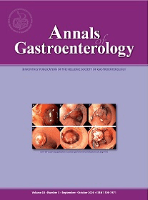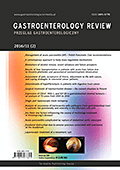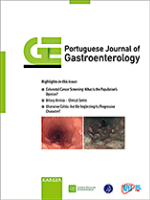
Therapeutic Advances in Gastroenterology
Scope & Guideline
Transforming patient care through innovative findings.
Introduction
Aims and Scopes
- Inflammatory Bowel Disease (IBD) Research:
A significant focus on the pathophysiology, treatment, and management of IBD, including Crohn's disease and ulcerative colitis, with an emphasis on biological therapies and the impact of these diseases on patients' quality of life. - Gastrointestinal Oncology:
Research addressing various aspects of gastrointestinal cancers, including colorectal cancer and hepatocellular carcinoma, with a focus on novel treatment strategies, early detection, and management of cancer-related complications. - Innovative Therapeutics and Technologies:
Exploration of new therapeutic agents, including biologics and small molecules, as well as advancements in endoscopic technologies and artificial intelligence applications in diagnosis and treatment. - Microbiome and Gastrointestinal Health:
Investigation into the role of gut microbiota in health and disease, including its impact on IBD, Clostridioides difficile infections, and other gastrointestinal disorders. - Patient-Centered Care and Quality of Life:
Studies focused on the psychosocial aspects of gastrointestinal diseases, including patient preferences, quality of life assessments, and self-management strategies. - Epidemiology and Public Health:
Research highlighting the epidemiological trends and public health implications of gastrointestinal diseases, including risk factors, disease burden, and healthcare resource utilization.
Trending and Emerging
- Artificial Intelligence and Machine Learning:
A growing trend in the application of AI and machine learning for diagnostic and therapeutic purposes in gastroenterology, particularly in the assessment of imaging results and personalized treatment plans. - Precision Medicine in Gastroenterology:
Increased focus on precision medicine approaches, including biomarker-driven therapies and personalized treatment strategies tailored to individual patient profiles. - Gut Microbiome Research:
An expanding body of research exploring the role of the gut microbiome in gastrointestinal health and disease, with implications for treatment strategies and disease management. - Telemedicine and Remote Patient Monitoring:
Emergence of studies focusing on telehealth solutions, particularly in the context of the COVID-19 pandemic, highlighting the importance of remote care and patient engagement. - Mental Health and Gastrointestinal Disorders:
Growing recognition of the interplay between mental health and gastrointestinal diseases, emphasizing the need for integrated care that addresses both physical and psychological aspects. - Health Economics and Outcomes Research:
A trend towards evaluating the economic impact of gastroenterological treatments and the importance of cost-effectiveness analyses in guiding clinical decisions.
Declining or Waning
- Traditional Pharmacological Approaches:
There is a noticeable decrease in studies focusing on conventional pharmacological treatments for gastrointestinal disorders, as newer biological therapies and personalized medicine approaches gain traction. - Surgical Interventions in Gastroenterology:
Research related to traditional surgical interventions is less frequent, possibly due to advancements in minimally invasive techniques and endoscopic procedures that are becoming preferred treatment options. - General Gastroenterology Topics:
Focus on broad gastroenterology topics without a specific disease or treatment angle is less common, as the journal increasingly emphasizes specialized research and targeted therapies. - Non-invasive Diagnostic Techniques:
Although still relevant, the volume of studies on non-invasive diagnostic techniques has diminished as the field moves toward more advanced imaging and endoscopic methodologies. - Basic Science and Mechanistic Studies:
There appears to be a decline in purely basic science research without direct clinical applications, as there is a stronger emphasis on translational research that bridges laboratory findings to clinical practice.
Similar Journals

Annals of Gastroenterology
Fostering Excellence in Gastroenterological StudiesAnnals of Gastroenterology, published by the Hellenic Society of Gastroenterology, serves as a pivotal platform for advancing the field of gastroenterology, highlighting research that spans across the spectrum of gastrointestinal diseases and treatments. With an ISSN of 1108-7471 and E-ISSN of 1792-7463, this journal has established itself as a reputable source of scholarship since its inception in 2000, converging valuable insights through to 2024. Ranking within Q2 of its category and achieving a respectable 78th position out of 167 in the Scopus rankings, the journal holds a strong presence in the academic community, appealing to researchers, clinicians, and students alike. Although not an open access publication, Annals of Gastroenterology is dedicated to disseminating high-quality research that aids in the understanding and treatment of gastrointestinal conditions, making it an essential reference point for those engaged in this dynamic field.

Translational Gastroenterology and Hepatology
Transforming Laboratory Insights into Clinical Excellence.Translational Gastroenterology and Hepatology, published by AME Publishing Company, stands as a pivotal platform for advancing the understanding and treatment of gastrointestinal and liver diseases. With its focus on translational research, this journal aims to bridge the gap between laboratory discoveries and clinical applications, thus fostering improvements in patient care. Although specific metrics like H-Index and Scopus ranks are currently unavailable, the journal is committed to maintaining high standards of scholarly communication and excellence. As an open-access publication, it ensures that valuable findings are readily accessible to a global audience, promoting collaboration and innovation among researchers, clinicians, and healthcare professionals invested in gastroenterology and hepatology. The journal's dedication to disseminating groundbreaking research makes it an essential resource for those seeking to stay at the forefront of these ever-evolving fields.

Cellular and Molecular Gastroenterology and Hepatology
Transforming the landscape of gastroenterology and hepatology.Cellular and Molecular Gastroenterology and Hepatology, published by Elsevier Inc, is a premier Open Access journal dedicated to advancing the understanding and treatment of gastrointestinal and liver diseases. Since its inception in 2015, this journal has established itself as a leading publication within its field, boasting impressive metrics with a 2023 Q1 ranking in both Gastroenterology and Hepatology. It ranks #10 out of 167 in Gastroenterology and #11 out of 82 in Hepatology on Scopus, placing it in the 94th and 87th percentiles, respectively. This journal aims to disseminate high-quality, peer-reviewed research that fosters innovative solutions for clinical challenges, making it an invaluable resource for researchers, healthcare professionals, and students alike. With open access, all published content is readily available to a global audience, ensuring that critical findings in cellular and molecular biology related to gastroenterology and hepatology reach those who can benefit the most from the latest advances in the field. For more information, please visit us at our address in San Diego, CA, or explore our articles online.

Visceral Medicine
Exploring New Horizons in Visceral MedicineVisceral Medicine is a distinguished journal published by KARGER, specializing in the fields of gastroenterology and surgery. With an ISSN of 2297-4725 and an E-ISSN of 2297-475X, this journal has secured its place in the academic landscape since its inception in 2016, maintaining a consistent quality of research and fostering advancements in visceral health through the year 2024. With notable rankings within the 2nd quartile (Q2) for both gastroenterology and surgery categories, Visceral Medicine ranks #101 out of 551 in the Medicine & Surgery category and #67 out of 167 in Gastroenterology according to Scopus, reflecting its significant impact and relevance in the pursuit of scientific knowledge. Despite not being an open access journal, it provides valuable insights and original research aimed at professionals, researchers, and students keen on expanding their understanding of visceral diseases and innovative surgical techniques. The journal is headquartered in Basel, Switzerland, contributing to its reputation as a hub for high-quality scholarly communication within the medical community.

Gastroenterology Research
Connecting researchers and practitioners for better health outcomes.Gastroenterology Research is a prominent scholarly journal dedicated to advancing the field of gastroenterology. Published by ELMER PRESS INC, this journal serves as a vital platform for disseminating innovative research, clinical findings, and comprehensive reviews that explore the complexities of the gastrointestinal system. With an ISSN of 1918-2805 and an E-ISSN of 1918-2813, it reaches a global audience of researchers, healthcare professionals, and students eager to contribute to or keep abreast of the latest developments in gastroenterology. Though details such as the H-index and Scopus rankings are currently unspecified, the journal's commitment to quality and impact in the medical research community is evident. Gastroenterology Research aims to foster collaboration and knowledge sharing among experts, ultimately improving patient care and outcomes within this critical area of health science. Explore the cutting-edge studies published within its pages and engage with a community passionate about the investigation and treatment of gastrointestinal diseases.

Korean Journal of Gastroenterology
Elevating Understanding of Gastrointestinal DisordersKorean Journal of Gastroenterology (ISSN: 1598-9992, E-ISSN: 2233-6869), published by the Korean Society of Gastroenterology, has been a premier outlet for research and advancements in the field of gastroenterology since its inception in 1968. This open-access journal, based in South Korea, fosters a global dialogue on gastrointestinal health, embracing contributions from a diverse array of disciplines within medicine. It is currently ranked in the Q4 quartile for miscellaneous medicine and holds a Scopus rank of #323 out of 636 in general medicine, reflecting its commitment to publishing impactful research despite its relatively recent establishment in high-impact metrics. With a continuous publication timeline extending through to 2024, the journal aims to enhance understanding of gastrointestinal disorders and promote innovative treatments, making it an essential resource for researchers, clinicians, and students alike who seek to stay abreast of the latest developments and clinical applications in gastroenterology.

JOURNAL OF GASTROENTEROLOGY
Innovating insights for improved patient outcomes.JOURNAL OF GASTROENTEROLOGY, published by SPRINGER JAPAN KK, is a premier academic journal that has been at the forefront of gastrointestinal research since its inception in 1994. With an impressive Impact Factor and ranking in the top quartile (Q1) of its category, this journal holds a significant place in the field of gastroenterology, currently ranked 12th out of 167 in Scopus, placing it in the 93rd percentile. The journal serves as an essential platform for disseminating innovative research, clinical studies, and reviews that foster advancements in the understanding and treatment of gastrointestinal diseases. Although it does not offer Open Access options, it provides researchers, clinicians, and students access to crucial insights and breakthroughs pivotal to improving patient care and outcomes in gastroenterology. With a commitment to high-quality peer-reviewed content, JOURNAL OF GASTROENTEROLOGY plays a vital role in shaping the future of gastrointestinal health and research.

Gastroenterology Review-Przeglad Gastroenterologiczny
Pioneering Insights in Gastrointestinal MedicineGastroenterology Review-Przeglad Gastroenterologiczny is a premier, peer-reviewed journal published by TERMEDIA PUBLISHING HOUSE LTD, focusing on the dynamic field of gastroenterology. Since its inception in 2006, it has embraced an Open Access model, ensuring that the latest research is readily accessible to a global audience, fostering collaboration and innovation. Based in Poland, this journal serves as a crucial platform for disseminating significant findings in gastrointestinal research, with a current Scopus rank placing it at the 39th percentile in its category. With a commitment to advancing the understanding of gastroenterological conditions, *Gastroenterology Review* publishes original articles, reviews, and case studies that contribute to both clinical practice and academic research. The journal is particularly aimed at researchers, healthcare professionals, and students who ignite dialogues that shape the future of gastrointestinal health. Explore the comprehensive insights that this journal offers, as it encapsulates vital developments from 2008 to 2024 in the ever-evolving landscape of gastroenterology.

GE Portuguese Journal of Gastroenterology
Elevating Standards in Gastroenterology Research and PracticeThe GE Portuguese Journal of Gastroenterology, published by KARGER, is a prominent platform in the field of gastroenterology, providing a vital forum for the dissemination of high-quality research since its establishment. With an open access model implemented in 2012, the journal ensures that emerging findings in gastrointestinal health are readily accessible to a global audience, facilitating the exchange of critical knowledge among researchers, practitioners, and students alike. Based in Switzerland, this journal has earned a respected position within the academic community, currently holding a Q3 ranking in the gastroenterology category for 2023, alongside a Scopus rank of #113 out of 167 in its field. Spanning converged years from 2014 to 2024, the GE Portuguese Journal of Gastroenterology aims to bridge gaps in research and practice, fostering collaboration and innovation across diverse areas within the discipline. Authors and readers alike benefit from the journal's commitment to advancing knowledge and practice in gastroenterology.

Advances in Digestive Medicine
Empowering Progress in Digestive Medicine ResearchAdvances in Digestive Medicine is a premier scholarly journal dedicated to the evolving field of gastrointestinal health and diseases. Published by WILEY, this journal aims to disseminate high-quality research encompassing a wide range of topics related to digestive medicine, from foundational studies to innovative clinical applications. As a significant resource for researchers, professionals, and students alike, Advances in Digestive Medicine fosters a deeper understanding of digestive disorders, promoting collaboration and knowledge exchange within the scientific community. Although it offers subscription-based access, the journal ensures comprehensive coverage of groundbreaking studies that significantly impact clinical practice and patient care in the field. With an ISSN of 2351-9797 and an E-ISSN of 2351-9800, it stands as an essential platform for anyone involved in digestive health research.